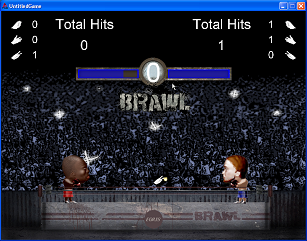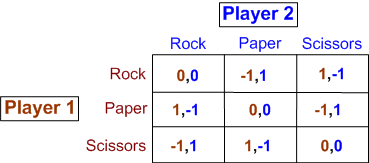
Rock, Paper, Scissors (RPS)
RPS (also known as jan-ken-po, rochambeau or
roshambo, ching-chang-wulla, …), is based on the well known
children’s game, where, with the uniform probabilities (of 1/3), two players
pick simultaneously a rock, paper, or scissors:


| · |
Rock wins over
scissors |
| · |
Paper wins over
rock |
| · |
Scissors wins over
paper |
If both
players pick the same object, there is a tie. This is a
zero sum game theory game (the only equilibrium is in mixed strategies).
The game can
be played with skill if the game extends over many sessions, as a player can
often recognize and exploit the non-random behavior of an opponent. Then it is
up to a player to determine the best competing strategy. In this case,
when playing against the computer, the computer can create random strategies,
each strategy lasting over many sessions. The game supports probability
and statistics curriculum, data analysis, decision trees, strategic choices,
etc.
Example 1:
Classical case:
both players randomly choose rock, paper, or scissors (probability of 1/3). Long-term
prediction is that there will be a tie. This can be tested by data
collection and analysis. Assuming both players can choose randomly this is a
fair game.
Example 2: One object case: One of the players always
chooses one object, say scissors, while the other stays with a totally random
strategy. Who wins in the long run?
Example 3: Different probabilities: One of the players (for example the
computer) chooses his probabilities. Can the second player (the student)
recognize the first player’s pattern of play and choose his
strategy/probabilities to beat the first? Explorations, data analysis and
decision trees help students choose the right strategies.

Download
RPS Beta version now to play it on your
computer.
RPS
Payoff Grid/ Scoring Table
Download RPS Beta version now and play it on your
computer.

RPS
Game Development Team
Concept Design: Alex Rieger
Game Programming:
Timmothy Smith
Graphic Artist: Alex Rieger
California State
University Channel Islands Students






